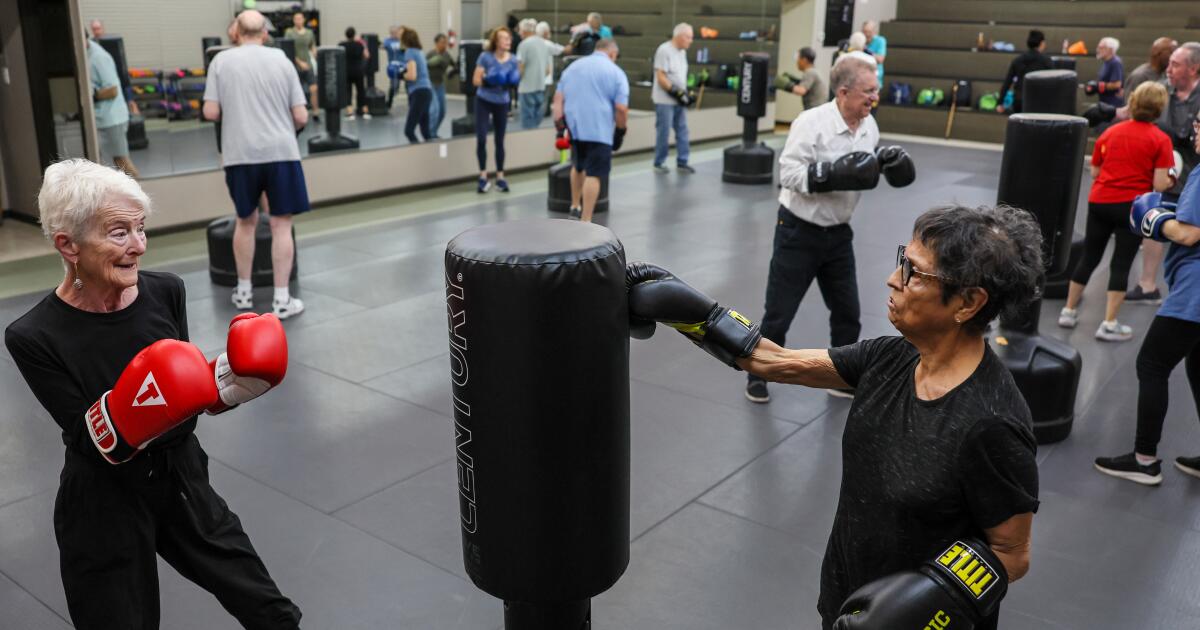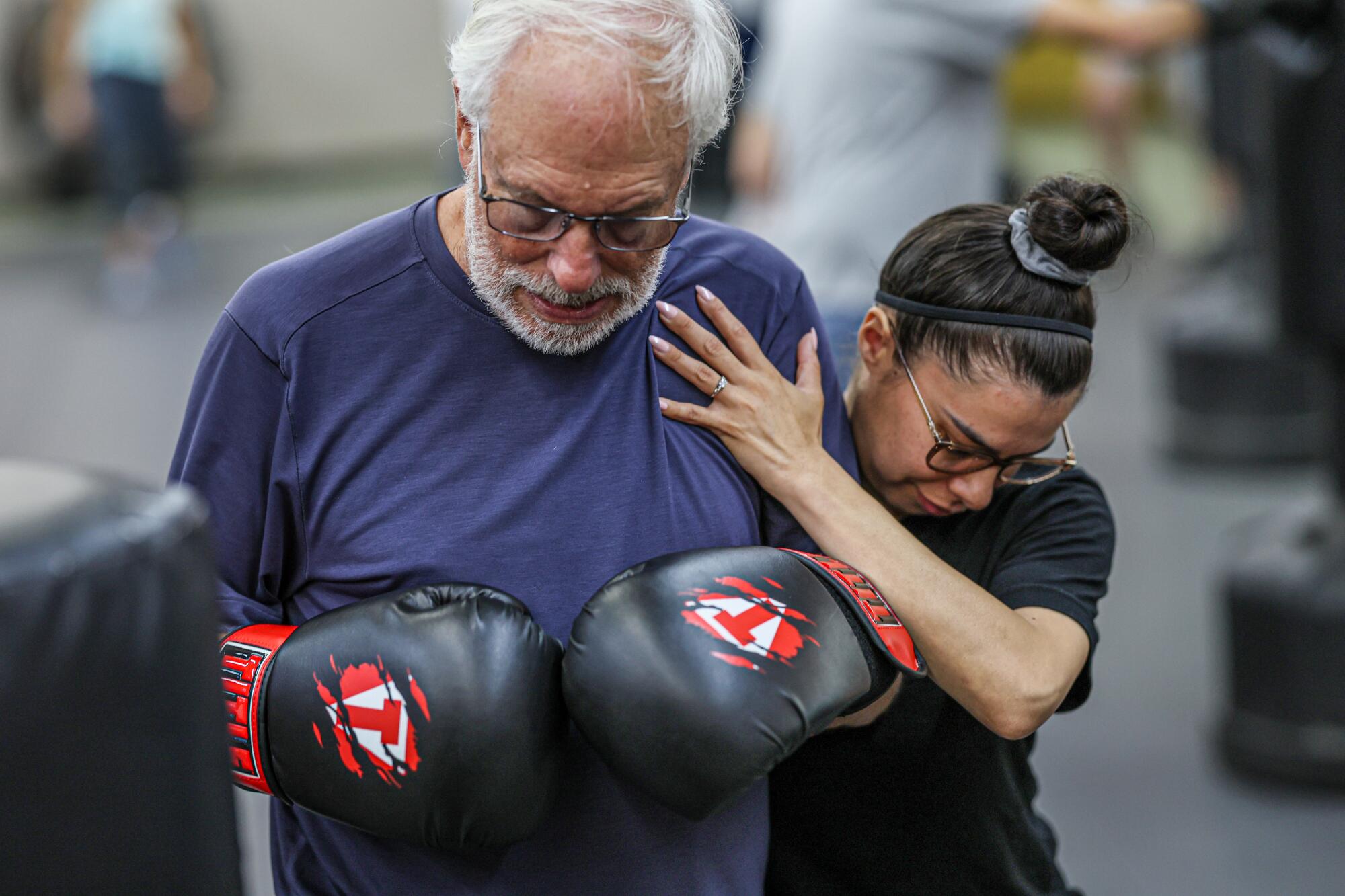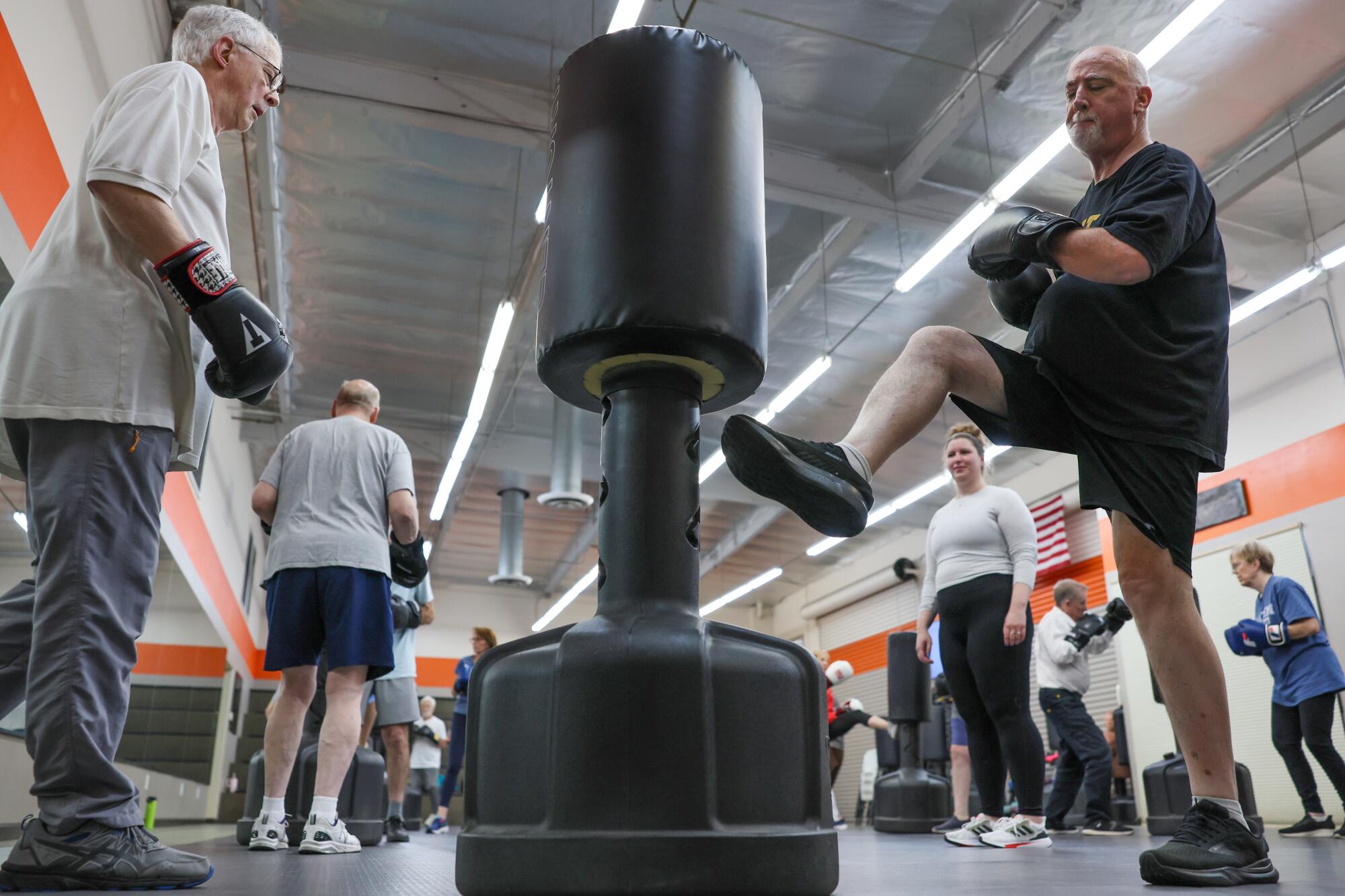Bill Plaschke: Fighting Parkinson's One Punch at a time

They pull giant boxing gloves on aging, sometimes shake hands.
They approach a black punching bag on the tired, sometimes banal feet.
Then they moan.
Lord, moaning.
They struck the bag with a left blow, a setback on the right, a hook, another hook, a uppercut, another blow, bam, bam.
They put an end to the burst with kicks, side kicks, push kicks, wild kicks, their sudden legs strong and determined and supplied by a force which once seemed impossible.
Apart from this little gymnasium in an indefinable office park in Monrovia, they are elderly people struggling with the Movement Movement Nightmare that is Parkinson's disease.
But inside the walls of Kaizen Martial Arts & Fitness, in a program known as Kizen kinetics, they are heavy goods vehicles.
Ranging from 50 to 90 years, covering the spectrum of rapid progress towards wheelchairs, it is the most courageous athletes I have met.
They present themselves here every two days hoping that they will move enough to keep the evil Parky at a distance. They try to hit him, throw it, scare it and end up more than an hour of sometimes painful exercise for it to happen.
These are fragile women who howl: “Jab!” And trembling men howling, “Crow!” And everyone counts with tight teeth for 75 minutes that stretch the narrowed muscles and test tired optimism.
Bill Plaschke participates in a boxing course for people with Parkinson's disease in Kaizen Martial Arts Studio.
(Robert Gauthier / Los Angeles Times)
I am impressed by them, maybe because I am one of them.
I too live with Parkinson's disease.
Irony, huh? I spent all my career writing triumphant stories about athletes overcoming illness and adversity, only to reach the home section which has trouble finding a similar triumph in a story about me.
It is not easy. Now I know what all these subjects of all these well-being stories understood the truth behind my positive prose. Degenerative disease sucks beyond any inspiring adjective. Incurable disease stinks beyond the title of hope.
I have parkinson, and it hurts to say it. I am always mobile, always active, I do not have the brand tremors that distinguish the famous Michael J. Fox or the late Muhammad Ali but, damn it, I have it.
I was diagnosed four years ago after complaining of weakness in my right arm. This weakness has disappeared, but it is a constant struggle to prevent everything from going slowly to hell.
Every day, I feel like I run a marathon. I move well, my balance is fine, but I am always tight, which always creaks. The quantity of drugs needed to keep me active is so huge, my pills are available in gallon jugs and I pass whole Dodger games trying to swallow them discreetly in the press box.
I move more slowly now. My fiancée Roxana qualifies for holiness because each time we go out, she must wait patiently that I dress, which takes an eternity and is accompanied by the impious sounds of the struggle.
I don't smile as much now. It is more difficult to smile when it is afflicted with the masked face of the Parkinson brand. When I faceTime with my darling Daisy, I worry that she will not see beyond my expression of Dour and never knows how much her grandfather loves him.
Until now, my state has only been known to my family. Even my bosses did not know. I did not look like Parky, I did not act as Parky, so why should I publicly reveal something so personal and embarrassing?
Yeah, I was embarrassed. I felt humiliated in a way that had no meaning and total. For me, Parkinson implies fragility, the parkinson implies weakness.
But let me tell you that a 72-year-old woman beat the living hell of a punch bag is not weak.
And that's why I write about it today.
If my boxing classmates can have the strength to sweat through their tremors and Wallops through their fears, then I can certainly have the strength to celebrate them without worrying about the type of light that he throws me.
I am proud to be one of them, and the goal of this chronicle is to reflect this pride and perhaps facilitate other people with swinging by Parkinson.

Alan Shankin is assisted by the Desiree Alvarado, a physical therapy student at Azusa Pacific University, while participating in a boxing course for people with Parkinson's disease in Kaizen Martial Arts Studio.
(Robert Gauthier / Los Angeles Times)
Officially, Parkinson is a neurodegenerative disease impacting motor and non -motor systems. Translated, the brain slowly ceases to produce dopamine, which is crucial for movement, and the loss of this neuro-transmitter affects everything, from your stride to your speech.
In the United States, about a million people have it, and there is no remedy for this, and it generally gets worse as we age. As Michael J. Fox himself said one day, it is the gift that continues to take.
You will not die, but it can be difficult to live with it, but there is one thing that undoubtedly contributes to slowing down its progress.
Exercise. Movement. Pull your sister from the sofa every day and work on these trembling muscles, stretch these tight joints, maybe join one of the many parkinson programs in town that involve everything, from dance to hiking.
“For people living with Parkinson's disease, regular exercise can reduce symptoms, help treatments to work better and potentially even slow down the progression of the disease,” Rachel Obohun, the main medical advisor to the Michael J. Fox foundation, wrote. “For some, the exercise may resemble participation in boxing lessons. For others, it is water aerobic, dance or pickleball. Remember that any type of exercise can positively support your trip. ”
If you are like me and just want to hit Parky in the face, boxing works better. The 83 difficult souls who do not pay $ 179 a month to fight in the Kaizen kinetic program agree.
“I hit the very strong bag as if I hit Parkinson,” said Rich Pumilia, 66, lawyer for Monrovia. “Return to what he does to me.”
I read Jody Hould's program, which she led with the help of her husband, son Zac and Anthony Rutherford, shortly after my diagnosis. I continued to see their brochures in doctors' offices and rehabilitation centers. At the time, they were part of Parkinson's popular Stable Rock Rock Box Box program, which has several locations across southern California. As I worked on the courage to face my illness and call the number on the brochure two years ago, Kaizen had become an independent program with a similar accent on boxing.
“Boxing is balanced, posture, turning, pivot, extension, amplitude of motion, using your nucleus, everything that is important to combat disease,” said Hould, who started the program nine years ago in memory of her deceased mother, Julie, who died of Parkinson complications. “In addition, it's fun to hit something.”
Hould and his team lead a quick program, barking a series of punches and kicks while offering sweet reminders to those who hang when they should travel.
“Parkinson does not take a vacation, it takes no day, we must be at the top of our game, we must be proactive in our fight,” said Hould. “Not only is it good for the mind, but it's good for the mind.”
But it can be difficult on the ego, as I quickly learned when a woman with frail white hair passed one day by screaming on the bag. Another time, an aging man with tremors and mixed steps have pounded the bag so strong that he skidded in my feet.
Once, I introduced myself with a cut on my left hand and I informed that I would not box that day.
“You still have your right hand, right?” She said. “So you box with one hand.”

Bill Plaschke, right, and Paul Telstrom combine during a boxing class for people with Parkinson's disease in Kaizen Martial Arts Studio.
(Robert Gauthier / Los Angeles Times)
The 75 -minute sessions are difficult. Each exercise and maneuver are apparently designed to do something that I now find it difficult to do. Sometimes it hurts. Sometimes you want to be elsewhere.
But it works. He can't kill Parky, but that can calm him. Should never promise a remedy, but it sees a certain relief among those who join the battle. There was a boxer who finally abandoned his walker. Others have seen a reduction in their tremors. Throughout the windowless gymnasium, there is a real hope that this disease can be slowed down.
Pumilia is convinced that her condition improved after taking lessons for eight weeks.
“When I was diagnosed, my doctor said that you had good good years before your life was affected,” said Pumilia. “Now my doctor essentially says:” I don't know what you are doing, but continue to do it. “”
Sharon Michaud, 65, a retirement insurance director who has also come to class for eight years, agrees.
“Without a doubt, that helped me,” said Michaud, who is noticeable in the classroom because she moves like a gymnast. “With Parkinson, it is easy to get into a funk and depress yourself. You come here and it is good to know that there are other people like you. I am surprised that more people do not know that there are places like that here. ”
Maybe this story will highlight this. Perhaps this story will inform a closed Parkinson patient about programs like Kaizen Kinetics and allow them to get the phone and join.
If you decide to come to MONROVIA, I will be the guy breathless on the back still unable to deliver a punch with direct elimination but continuously inspired by the other fighters to continue to exchange blows with my most difficult truths.
I leave this gymnasium in sweat and painful but mounted with the recall that I have the chance to lead a wonderful active life filled with family and friends and work and travel and therefore, so much hope.
I have parkinson. But, by God, that didn't.




